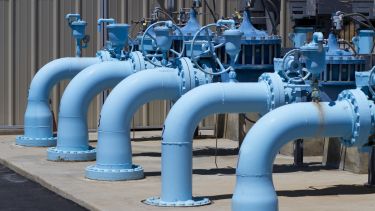Urban potable water systems
A multidisciplinary approach to drinking water distribution systems.

Drinking water distribution systems represent the last frontier in ensuring the basic human right and foundation of society: safe, secure drinking water.
This essential service is provided through ageing, buried infrastructure that is endemic throughout our urban environment. We seek to understand and develop novel solutions for the proactive management of this distributed infrastructure such that it can continue to be best utilised and necessary investment targeted and minimised to meet the challenges of ageing deteriorating infrastructure, climate change and increasingly demanding populations.
We take a multidisciplinary approach to drinking water distribution systems, from the fundamental to the applied with a particular emphasis on full-scale representative laboratory-based facilities complemented with field experiments in operational systems with our various close water company partners.
This research activity can be divided into aspects related to water loss, water quality and transients, but we always take an integrated approach fully cognisant of the complex interactions and interconnections of these vast, uncertain infrastructure systems.
Water loss
Research into leakage and bursts ranges from understanding the fundamental mechanisms of pipe failure, through to novel detection and location, for instance involving the development and application highly innovative soft computing / artificial intelligence techniques.
Specific research into water loss focuses on:
- Soft computing techniques for anomaly detection
- Optimal instrumental
- Pressure dependent leakage behaviour
Quality
Ensuring water quality and protecting public health and wellbeing is the overriding purpose of water supply systems and we have led a drive to see the distribution system as the last vital frontier in this provision. We consider water distribution systems as vast physical, chemical and biological reactors with highly variable residence times where the processes occurring are dominated by the pipe surfaces of the ageing infrastructure.
Specific research into water quality focuses on:
- Discolouration
- Biofilms - physical and community structure
- Chlorination regimes
Transients
Once viewed as a mechanism occurring only in large pumping mains, we have driven data collection campaigns to evidence their occurrence through the complexities of water distribution systems. We have also demonstrated their critical role in both structural and water quality processes within water distribution systems. However, we do not consider only negative effects of transients – they are also a potential source of vital system information.
Specific research into transients focuses on:
- Field Monitoring
- Probabilistic Modelling
- Contaminant Ingress
Facilities and resources
Key drinking water distribution systems facilities and resources that the PWG offered are:
- 600m long, 80mm diameter, temperature and hydraulically controlled plastic pipe test facility for water quality.
- 150m long, 50mm diameter, fully instrumented and control plastic pipe test facility for studying and demonstrating hydraulic transients
- Field monitoring equipment including highly accurate measurement of discolouration (turbidity, organic and inorganic), hydraulic transients and field deployable flow cytometry equipment for live and dead quantification of bacteria.
- Advanced microbial techniques for analysis of physical and community structure of bulk (planktonic) and attached (biofilm) material.
- Modelling expertise, including development
- Advance and support for the development of discolouration and other network operation and maintenance management strategies.
Key people
-
Catherine Biggs
Example projects
PODDS
This theme of research has driven a fundamental step-change in the way the international water industry considers the processes leading to discolouration events in water distribution systems as well as an extensive series of leading journal and conference papers, various international collaborations and keynote talks.
Pipe Dreams
The vision of this project is to transform the operation and management of buried water distribution system infrastructure, maximising performance to meet the combined impacts of climate change, increasing societal demands for water quantity and quality and changing population densities, ensuring the delivery of safe wholesome water for public health and well being throughout the 21st Century and beyond.
